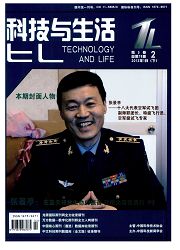《科技与生活》
读史使人明智
来源:科技与生活 【在线投稿】 栏目:期刊导读 时间:2020-12-271 我们生活在当下,筹划着未来,为什么要 2 似应译成“Why do we want to study history?”,而bother about是一种语气,如:If you feel terri fic now, you may not be bothered about learning things like re finance.(如果你认为现在很好,就不必去学选择投资那类的东西。) [2]如果把目光沿着人类走过来的道路向回望去,便会发现:我们其实都是历史的产物。不知道过去,就不懂得今天,何谈 3 “何谈”似应用更为强烈语气的词语,how can…、what is…等,如:①如果中国不加入,又何谈世界贸易组织呢?(How can you call it a world trade organization if China is not in it?) ②在一个表达自由都不存在,只能使用暗语言的国度,又何谈艺术?(In a country where free expression is inexistent and people can only use code-words and abbreviations, what is there to speak about art?)这里将其融合在一种更为平和的句式中。 We live in the present and plan for and worry about the future, so why are we bothered about knowing the things of the past? Is there any truth in Francis Bacon’s saying “Histories make men wise”? [2] Looking back along the road from which human beings have come, it is easy to find that we are all the products of history. Failing to know the past you will never fully comprehend the present as a modern human. It is thus no surprise to see the practice in the West where having a certain kind of historical knowledge has been seen as a sign distinguishing the educated from the uneducated. Queen Elizabeth II recalls in her memoirs that history was the subject she favored and scored best at during her school years. In a way, history symbolizes the quality and demeanor of a person. [3]中国是一个具有五千年历史的文明古国,中国文化是世界上唯一没有被历史中断的古老文化,因而“中国人”出现在世界任何地方,总与 4 “总与”,未必用always, 可用其他词语或表达方式,如:①不论发生什么事,上帝总与你同在。(God will be with you no matter what happens.)②如果你总与过去的悲观打交道,那么很可能在面对错误的判断时,做出错误的决定。(If you approach the past with pessimism, there is a possibility of making wrong decisions arriving at erroneous judgments.)此处用了whenever…。 [4]在中国文化里,“六经皆史”。历史提供了知识与智慧的源泉。唐太宗说,“以铜为鉴,可正衣冠;以古为鉴,可知兴替;以人为鉴,可明得失”。历史总有规律 5 说到“规律”,用的最多的是law、rule,但也可用pattern,如:所有列举的例子都遵循同一规律。(All of the examples presented here follow the same pattern.)此处更有形象感。 [3] China is a country with an ancient civilization of five thousand years and Chinese culture is the only traditional culture in the world that hasn’t been disrupted by history. “Chinese”, whenever they go in the world, carry the badge of a long historical background whether they realize it or not. They should be proud of knowing their history and ashamed of ignorance. [4] In Chinese culture, “all classics are history”, which provides a source of knowledge and wisdom. As Emperor Taizong(599-649) of the Tang Dynasty said, “By looking in a mirror, you can dress up properly; by witnessing the rise and fall of dynasties in the past, you draw lessons from history; by learning from others, you realize both gains and losses”. History has after all certain patterns emerging in its course, just as there is a logic underpinning the development of all things. A sense of history in today’s world has certainly also to be globalized. [5]唯其具有历史眼光,才能深刻理解当今社会现象,因为那不过是历史的延续。不知秦政,何以认识中国延续两千余年并影响后世的专制制度?不知鸦片战争,怎能理解 6 这里的“理解”没有用通常的understand、comprehend、make out 等,而是用了更口语化的 have a grip on…,如:They have a good grip on the situation.(他们透彻了解、把握了局势。) 7 没有延续前面的反问句式,而改为陈述句,以示变化。 [6]有历史感的人,看问题不会只聚一点、限于表面,而可通观脉络、深入实质。进而,形成立体性思维,以发展性眼光对待一切,因而也更容易明确 8 “更容易明确”一般多用 It becomes more easier and clear…,但此处navigate… more wisely为深层的释译。 [5] Viewing things historically enables one to penetrate social phenomena which in one way or another are a continuation of their precedents. Lacking the knowledge of administration in the Qin Dynasty (221-206 BCE), for example, how can one understand the autocratic system of two thousand years that had far-reaching influence on China’s succeeding politics? Being ignorant of the Opium War, how can one have a grip on the clue of “Western learning spreads to the East” or even the issue of Hong Kong?Having no idea of what the “New Cultural Movement” is, how can one adequately differentiate between classical and modern Chinese? Likewise, in comprehending the West, one has to learn about ancient Greek philosophy, which is the root generating Western ideologies; to be familiar with the Renaissance and Enlightenment, which inspired its modern scienti fic ideas, market economy, constitutional system, separation of the three powers, and even presidential elections in the USA, and so on. [6] With a sense of history, one will be equipped to judge issues more contextually and substantially, instead of being handicapped by bias and , with developed multidimensional thinking and a dynamic viewpoint,people can navigate their careers more wisely. [7]学习历史还可不断锤炼人们的道德意识。历史上出现过形形色色的人,善恶美丑,不拘一格,但是历史的长河像一面巨大的筛子,将是非曲直理清 9 “理清”还可有 ravel out、clarify、clear… up、take… in shape等。 10 这里的“真善美”是一种泛指,不一定都具体翻译出来,如“the true, the good and the beautiful”等,而可概述为 virtue;相对应的“假恶丑”,也不妨以evil 代之。 [8]甚至,一件小事,也会铭刻在史,给人启示。例如,春秋鲁襄公25年,太史书曰:“崔杼弑其君”,崔子怒而杀之,其弟接班,照写无误,又被杀,……直杀到第四个兄弟,仍照写无误 11 “仍照写无误”在表述和词序上都做了调整,将其译文放在了the second younger brother之后。 [9]的确,读史不仅仅 12 为表述其还有更多的含义,在译文里加上了省略号。 [7] Studying history can also temper one’s moral conscience. Given that various characters, good and evil, beautiful and ugly, have appeared in history, which acts as a huge filter, by unraveling the rights and wrongs throughout history, one may conclude that virtue has its own reward and evil gets punished. [8] Sometimes a little event is engraved in history, leaving much inspiration for generations to come. During the Spring and Autumn period (770—476BCE) in China’s history, for instance, in 548 BCE (the 25th year of the reign of Duke Xiang) of the State of Lu, a grand historian in charge of its historiography recorded that “Cui Shu assassinated his monarch”. So angry was Cui Shu that he had his historian his younger brother took over the office of grand historian and recorded the event using the same words, and was likewise executed. Next came the second younger brother, who again recorded the identical statement, and so on. The killing didn’t cease until the fourth brother was in charge, when Cui Shu finally gave up the idea of “erasing” history. Having read this story, one can’t help but sigh deeply about the character and sentiment of the four brothers who didn’t even leave their names in that history. [9] Indeed, histories contribute not only to wisdom… ■
